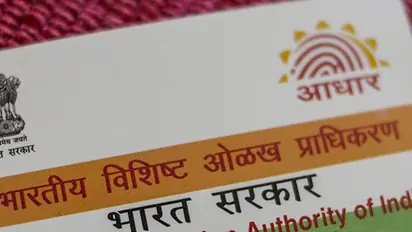Can Aadhaar and privacy exist side by side?

Synopsis
The point of discussion ever since the announcement has been how privacy becoming a fundamental right would impact several other factors. The Aadhaar Act was announced in 2016, which has many loopholes obviously, when it comes to privacy such as authority towards the collected information. Now, a separate five-judge Constitution Bench will be examining validity of Aadhaar.
A nine-judge Constitutional bench of the Supreme Court has declared in a landmark judgement that privacy is a fundamental right like the right to life.
The point of discussion ever since the announcement has been how privacy becoming a fundamental right would impact several other factors including the validity of WhatsApp's new privacy policy, criminalisation of homosexuality under the Section 377 and the validity of the Aadhaar scheme on the grounds that it is violating the right to privacy.
Now, a separate five-judge Constitution Bench will be examining validity of Aadhaar. This would mean it could also impact how your data is stored and accessed under the Aadhaar Act, including but not limited to, how government is using the data linked to all welfare services and just about everything. What began as a means for fair subsidy soon saw the document becoming mandatory for filing tax, banking and even telco services, to name a few.
The Aadhaar Act was announced in 2016, which has many loopholes obviously, when it comes to privacy such as authority towards the collected information. The bill didn't specify for what period of time a user's authentication records can be stored by UID or any other third-party requiring Aadhaar authentication. If these records are maintained over a long period of time, there are chances that some malicious minds could misuse them. Needless to say, the Aadhaar data challenge is why the privacy case was petitioned.
While all of that (linking to welfare plans) was done to ensure people's fair right over subsidies and to curb fakes, but in the bid to do so, the govt should begin considering the ill-effects such as how cyber criminals could use/sell/manipulate the data. We recently saw reports on how cyber-spying tools are likely being devised to extract Aadhaar data of Indian citizens.
Now, with the move of making privacy a fundamental right, it is difficult to imagine Aadhaar Act and privacy stay afloat on the same boat. The possibility of co-existence would depend upon what steps are taken to ensure that the data linked to Adhaar is kept private and any sort of unauthorised access is discarded.
We’ve seen the government's hypocrisy in the treatment given to WhatsApp policy case and Aadhaar, and considering the fundamental right on ‘case to case basis, will simply nullify its effect. A new structure underlying these concerns is now required.
Find the latest Technology News covering Smartphone Updates, AI (Artificial Intelligence) breakthroughs, and innovations in space exploration. Stay updated on gadgets, apps, and digital trends with expert reviews, product comparisons, and tech insights. Download the Asianet News Official App from the Android Play Store and iPhone App Store for everything shaping the future of technology.